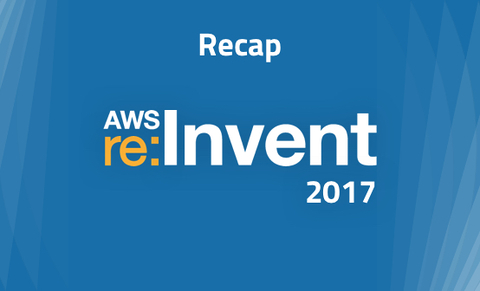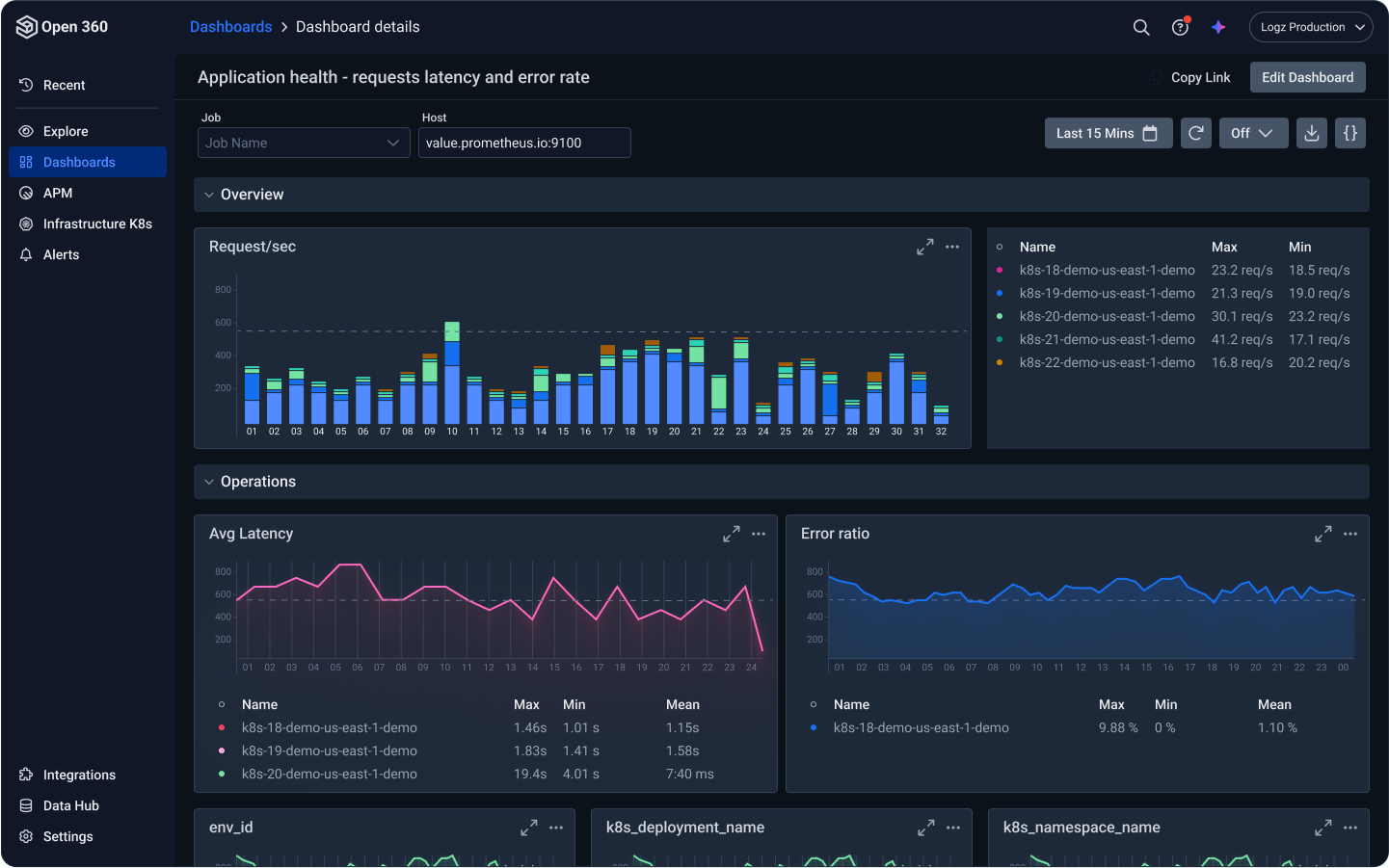
Re:Invent 2017–A Recap of AWS’s Latest Releases
December 7, 2017

Last week 43,000 engineers and tech enthusiasts descended upon Las Vegas for the event of the season, AWS re:Invent.
AWS’s annual bash gathers experts from around the globe to learn about the latest in cloud technology, machine learning, and more.
For the past three years, Logz.io is proud to have participated in re:Invent–this year as gold sponsors. There, we showcased our new features–Application Insights and Data Optimizer–had successful presentations by Danny Gueta of his MongoDB Dashboard (which won our Kibana Dashboard Contest), and had the opportunity to meet many of our customers and community members, who truly made the event one to remember.
Of course, being the belle of the ball, AWS also launched a range exciting features from new machine learning capabilities, to container orchestration tools, and even adding a new graph database along with increasing Lambda functionality.
Here, we’ll run through some of the highlights of AWS’s many feature releases and announcements presented at re:Invent 2017:
The Container Revolution
There’s no denying the tremendous impact containers (especially Docker) has had on IT Operations. That’s why both Google Cloud and Azure Cloud previously launched functionalities to integrate with Kubernetes, the leading container orchestration platform. Up until now, AWS had yet to create a seamless functionality for Kubernetes, but that all changes now, as AWS announced several new and exciting features to integrate with both Docker and Kubernetes over AWS re:Invent 2017.
EKS
Amazon’s EKS (Amazon Elastic Container Service for Kubernetes) was created to help users easily run Kubernetes on the AWS cloud without using Kubernetes clusters. The feature is designed to reduce manual labor associated with Kubernetes by managing masters across three availability zones, running automatic updates, and locating and replacing malfunctioning masters. In addition, it also supports the latest Kubernetes tools and community plugins, allowing you to easily run Kubernetes on the AWS cloud. Of course, being an AWS product, EKS also integrates with a variety of other popular AWS tools and features to ensure security and availability.
Fargate
Taking it a step further, AWS also announced the release of AWS Fargate. This new service was created to change the way we work with containers by eliminating the need to manage clusters and servers.
With Fargate, you run containers through EKS or ECS with your choice of launch types: Fargate or EC2. In the Fargate launch type, you simply define CPU, memory requirements, and networking and authentication protocols. EC2 launch type on the other hand, allows you to use EKS or ECS to maintain clusters of servers in order to provision placement of containers across various servers.
As a result of this new functionality, users can focus on creating and building applications as opposed to worrying about their infrastructure. Key benefits include easy scalability, elimination of cluster management, and seamless integration with Amazon ECS and EKS.
Accessible Machine Learning
Another exciting announcement from AWS is their newest machine learning offering, Sagemaker.
As you already know, machine learning is the “it” technology of the moment and Sagemaker makes it easy for organizations to take advantage of it without depending on a specialist. In other words, it democratizes machine learning so it becomes accessible to all.
This fully-managed service gives organizations the opportunity to build and train either supervised or unsupervised models and deploy them to production, while remaining scalable. Since it features models which are able to be used either together or independently for the purpose of building, training, and deploying ML models, users do not necessarily need to be familiar with specific algorithms that were previously needed for the creation of machine learning technology.
Databases Galore
In addition to jumping on the container bandwagon, AWS also announced the release of multiple database features such as DynamoDB, Aurora, and Neptune.
Neptune
The newest addition to AWS’s Database family, Neptune is a secure, highly scalable, and fully-managed graph database which can be used to run applications based on connected data-sets. Neptune easily integrates with both Apache TinkerPop and W3C’s RDF, making it simple to store relationships and query the graph.
Aurora
Aurora is AWS’s popular MySQL and PostgreSQL based relational database which has the combined benefit of a speedy proprietary database along with the flexibility of open source alternatives. It’s fast, highly available, secure, and automatically scales up to 64TB.
At this year’s re:Invent, AWS announced the release of a multi-master and serverless feature for Aurora. The new multi-master feature was created to improve Aurora’s high availability by allowing users to add many read/write master instances throughout many availability zones.
In addition to the multi-master feature, AWS also launched a serverless feature for Aurora as well. The serverless feature was designed to helps users with sporadic or fluctuating workloads scale up or down based upon the changing needs of their applications. As a result, you gain increased flexibility in regards to database management and no longer have to pay for space you don’t use.
DynamoDB
DynamoDB is AWS’s NoSQL database featuring automatic scalability, flexibility, and reliability. AWS describes it as ideal for applications which “need consistent, single-digit millisecond latency at any scale”.
Although DynamoDB itself has been around for quite some time, this year, AWS announced a new backup and restore feature as well as global tables for the popular NoSQL database.
The On-Demand Backup allows users to archive their DynamoDB databases in order to meet government data regulatory protocols. Instead of taking an enormous amount of time for backup and encryption, this feature will quickly store and encrypt all tables up to hundreds of terabytes without affecting your application’s performance or availability.
The Global Tables feature is ideal for applications which run across international regions. This fully managed and scaled, multi-master database feature can copy tables across any specified AWS region, so you no longer have to manually manage conflicts and updates across multiple regions.
Going Serverless
Lambda, AWS’s serverless technology, also received an upgrade announced at this year’s re:Invent. Since it can be difficult to control traffic coming from multiple sources into Lambda, AWS released CodeDeploy to direct traffic stemming from new functions and deployments based on their pre-assigned weight.
This works by appointing a Lambda alias to two function versions and delegating the percentage of traffic assigned to each.
As a result, users can easily test new updates prior to deploying it to all customers.
Other Goodies
With so many great new features rolled out at this year’s re:Invent, it’s difficult to narrow down the most important, and exciting tools to share. So here are a couple others worth a shout out:
GaurdDuty: GuardDuty is AWS’s fully managed threat detection platform. The feature identifies and isolates anomalies and potential threats, while maintaining scalability. Furthermore, it easily coordinates with CloudTrail and Lambda and is simple to use, even for those who lack security expertise.
VMware Disaster Reco: AWS’s newest integration with VMware allows for easy, swift disaster recovery. The feature makes copies of data and various applications in AWS to combat potential power outages and natural disasters, and can even help customers backup applications as they slowly move to the cloud.
See You Next Year!
As the leading public cloud provider, AWS certainly has an abundance of tools, features, security provisions, and more that allow their users to easily take advantage of the various benefits of cloud technology. Their keen ability to develop such a robust and diverse ecosystem makes AWS an unparalleled technology partner for various key players in the field…and they don’t throw a bad show either!
We look forward to attending next year’s re:Invent to see what other incredible technologies they have in store for the future.




